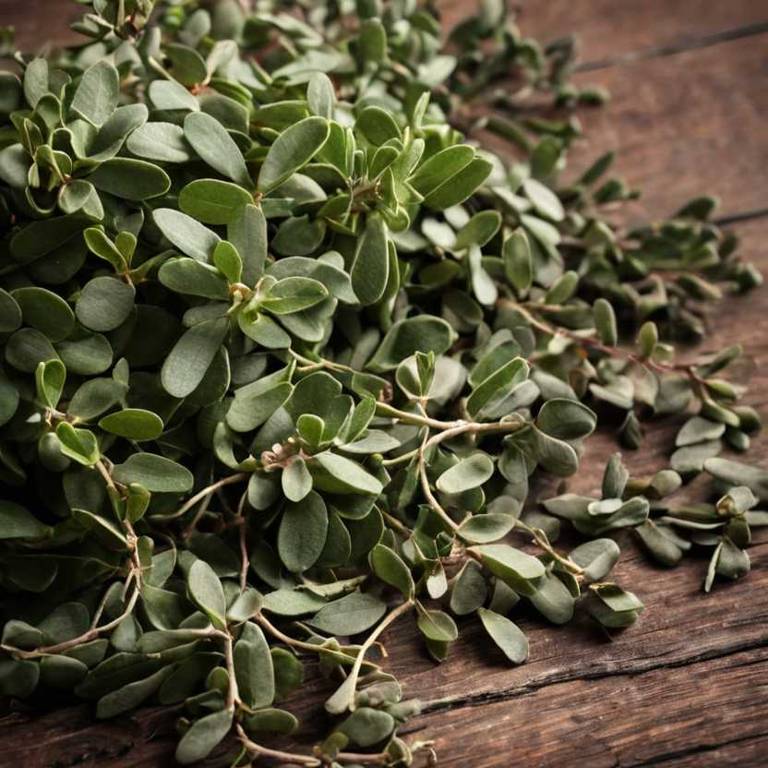Bearberry (Arctostaphylos uva-ursi)
Bearberry (Arctostaphylos uva-ursi) is a member of the Ericaceae family, native to North America, Europe, and Asia. Traditionally, its leaves, stems, and bark have been used for infusions, decoctions, and tinctures.
This herb is particularly valued for its diuretic, astringent, and anti-inflammatory actions, and has a long history of use in native american herbal medicine, european herbal medicine, and mediterranean herbal traditions.

Quick Facts / Key Information
| Common Name | Bearberry |
|---|---|
| Scientific Name | Arctostaphylos uva-ursi |
| Plant Family | Ericaceae |
| Genus | Arctostaphylos |
| Species | uva-ursi |
| Native Range | North America, Europe, Asia |
| Plant Parts Used | Leaves, Stems, Bark |
| Primary Medicinal Actions | Diuretic, Astringent, Anti-Inflammatory |
| Primary Traditional Systems | Native American Herbal Medicine, European Herbal Medicine, Mediterranean Herbal Traditions |
| Historical Preparation Methods | Infusion, Decoction, Tincture |
Botanical Identity
- Scientific Name
- Arctostaphylos uva-ursi
- Common Name
- Bearberry
- Synonyms / Alternative Names
- Kinnikinnick, Uva Ursi
- Plant Family
- Ericaceae
- Genus
- Arctostaphylos
Botanical Description
- Growth Habit
- Perennial herbaceous plant.
- Height
- It typically grows to a height of 0.3 to 1.5 meters.
- Leaves
- Evergreen leaves, needle-like, with upper surface dark reddish-brown and lower surface pale green, bearing stomatal bands.
- Flowers
- Inflorescence consisting of solitary flowers, each with five white petals, five yellow stamens, and a superior ovary with two styles, actinomorphic symmetry, and red-brown anthers.
- Stems
- Erect, woody, evergreen, with opposite branching, covered in short, glandular hairs, and bearing persistent, rounded leaves along the stem.
Traditional Uses / Historical Use
Traditional Systems
- Native American Herbal Medicine
- European Herbal Medicine
- Mediterranean Herbal Traditions
Historical Preparation Methods
- Infusion
- Decoction
- Tincture
- Poultice
Medicinal Actions
- Diuretic
- As described in traditional systems, a gentle diuretic, in urinary system discussions.
- Astringent
- In herbal literature, noted as a mild astringent, in drying-focused uses.
- Anti-inflammatory
- Historically regarded as a moderate anti-inflammatory, in inflammation-focused discussions.
- Antispasmodic
- Commonly referenced as a cooling antispasmodic, for cramp-focused discussions.
Active Compounds
- Tannin
- Plant-derived compounds known for their ability to bind proteins.
- Phenolic Acid
- A group of plant-derived compounds frequently identified in herbal material.
- Flavonoid
- Naturally occurring polyphenols that contribute to pigmentation and structural chemistry.
- Glycoside
- Secondary metabolites formed through glycosylation processes in plants.
Modern Research Overview
Scientific research related to this plant is ongoing. This section will be expanded in the future to include summaries of phytochemical studies, laboratory research, and other relevant scientific literature as it becomes available.
Safety & Contraindications
- General Precautions
- Precautionary considerations have been reported in relation to this herb.
- Contraindications
- Some conditions have been cited as contraindications for the use of this herb.
- Allergies
- Sensitivity or allergy-related effects have not been clearly established.
- Drug Interactions
- Available information regarding interactions with pharmaceutical drugs is limited.
- Toxicity
- This herb has been associated with toxic effects under certain conditions.
- Pregnancy & Breastfeeding
- Available information regarding use during pregnancy or breastfeeding is limited.
Preparation & Usage Methods
- Infusion
- Plant material is steeped in hot water to extract water-soluble compounds.
- Decoction
- Plant material is simmered in water to extract compounds from tougher parts.
- Poultice
- Fresh or dried plant material is applied externally to the skin.
- Tincture
- A preparation involving soaking plant parts in alcohol for extended extraction.
- Extract
- Extracts are created by dissolving plant material in a suitable non-alcoholic medium.
Growing, Harvesting & Storage
Growing / Cultivation
- Soil
- Prefers loamy soil with well-drained conditions. Typically grows best in moderate fertility soils.
- Sunlight
- Thrives in partial shade. Tolerates full sun to partial shade.
- Watering
- Prefers well-balanced moisture levels. Tolerates occasional drought.
Medical Disclaimer
The information provided on this page is for educational and informational purposes only. It is not intended to diagnose, treat, cure, or prevent any medical condition. Always consult a qualified healthcare professional before using any herb for medicinal purposes.